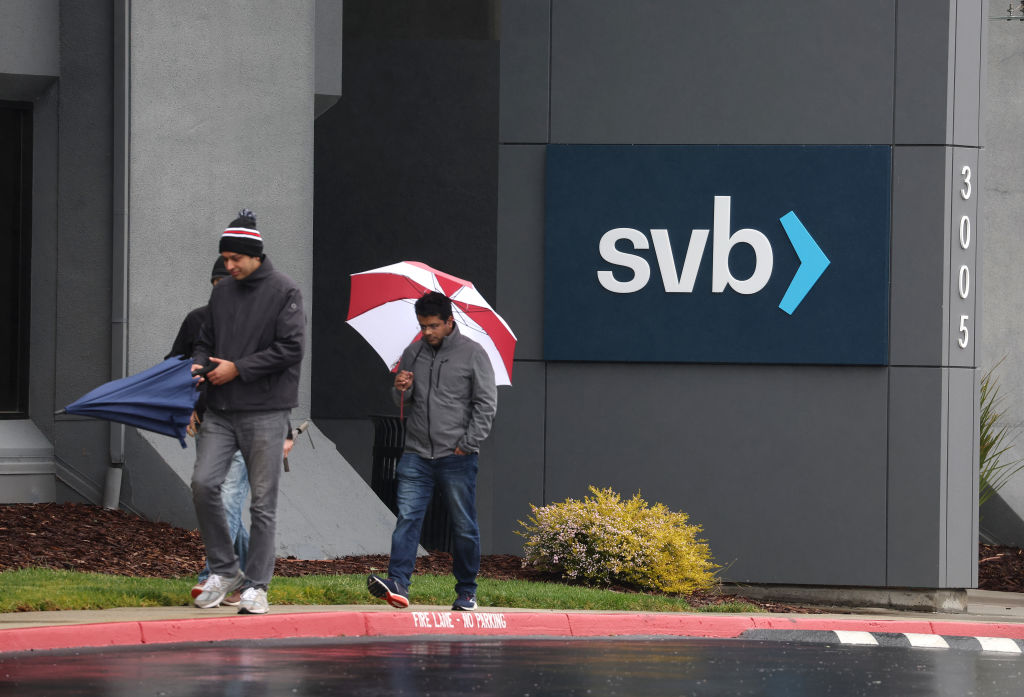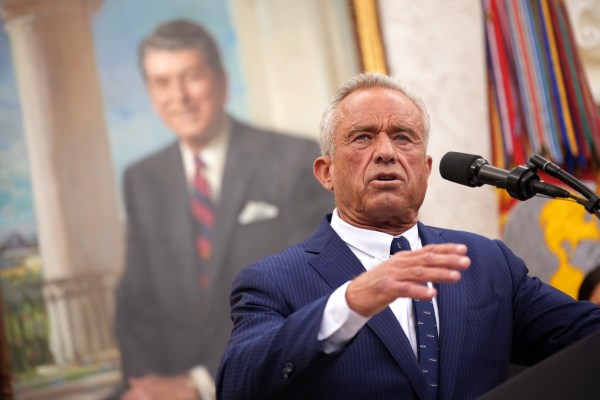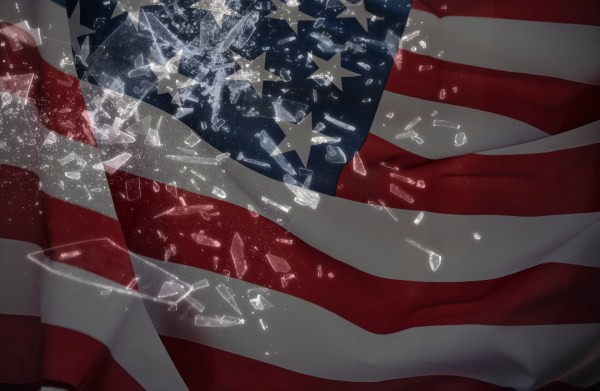Happy Monday! According to a new report from the Recording Industry Association of America, vinyl albums outsold CDs in the United States last year for the first time since 1987.
Coincidentally, the Chicago Bears are shaping up to be worth paying attention to this season … for the first time since … about 1987.
Quick Hits: Today’s Top Stories
- The heads of the Treasury Department, Federal Reserve, and Federal Deposit Insurance Corporation issued a joint statement on Sunday making clear that depositors at Silicon Valley Bank will have access to all of their money this morning after the FDIC assumed control of SVB on Friday amid a bank run that caused the institution to fail. “No losses associated with the resolution of Silicon Valley Bank will be borne by the taxpayer,” the statement read.
- The Bureau of Labor statistics reported Friday that U.S. employers added 311,000 jobs in February—down from 504,000 in January, but still exceeding economists’ expectations. The unemployment rate ticked up slightly from 3.4 percent to 3.6 percent as more people sought out work—the labor force participation rate shifted up from 62.4 percent in January to 62.5 percent. Average hourly earnings—a measure the Federal Reserve is watching closely in its fight against inflation—rose 0.2 percent month-over-month in February, and 4.6 percent year-over-year. Those figures were 0.3 and 4.4 percent in January, respectively.
- Following secret talks mediated by China, Iran and Saudi Arabia announced Friday they are resuming diplomatic relations, and expect embassies and diplomatic staff to be re-established in the coming months. The two Middle Eastern countries have had no official relations since 2016, when Saudi Arabia broke off ties after protesters attacked and burned the Saudi embassy in Tehran.
- By a 2,952-0 vote, the National People’s Congress on Friday officially confirmed Xi Jinping to serve a third five-year term as China’s president—only possible because he abolished the country’s two-term limit for the presidency in 2018. The presidential confirmation is largely ceremonial as Xi’s political power comes from serving as head of the Chinese Communist Party and military, positions he secured at the party congress in October.
- North Korea announced Monday that, one day earlier, it tested two submarine-launched cruise missiles capable of threatening U.S. bases in Japan and South Korea. The launch comes as the U.S. and South Korea plan to hold large-scale military field exercises today.
- The House voted 419-0 on Friday to pass a bill requiring the Office of the Director of National Intelligence to declassify all information related to COVID-19’s origins and send an unclassified report to Congress within 90 days. The Senate had already approved the bill by unanimous consent, and the overwhelming support for the legislation signals that, if President Joe Biden vetoes the bill, he will likely be overridden.
- Michael Cohen, Donald Trump’s former personal lawyer and fixer, is set to testify before a Manhattan grand jury this week in a case concerning hush money Trump paid to a porn star before the 2016 election. The Manhattan District Attorney’s Office invited Trump to testify before the grand jury last week, signaling the case may be moving toward an indictment.
- Two boats suspected of smuggling migrants capsized while approaching the San Diego coast on Sunday, killing at least 8 people. Lifeguards, the Coast Guard, and U.S. Border and Customs Protection agents were still searching for an estimated 7 additional individuals as of Sunday night.
- The 95th annual Academy Awards were held last night, with Everything Everywhere All at Once leading the way with seven Oscar victories, including best picture, best director, best actress in a leading role, best actress in a supporting role, and best actor in a supporting role. Brendan Fraser won best actor in a leading role for his work in The Whale.
RIP to SVB

No one is likely feeling the Daylight Savings hangover this morning more than the folks at the Federal Deposit Insurance Corporation (FDIC), who—alongside Treasury Secretary Janet Yellen and Federal Reserve Chair Jerome Powell—spent the weekend scrambling to keep the second-largest bank failure in United States history from precipitating a broader economic meltdown. We’ll officially find out if their efforts were successful when the markets open in a few hours, but early signs indicate the fallout will likely remain relatively contained.
The now-defunct financial institution in question is Silicon Valley Bank, dreamed up over a poker game and founded in 1983 to cater to the blossoming tech industry in, you guessed it, Silicon Valley. Startups flush with investor cash needed a place to park it—and bankers who understood the ins and outs of the burgeoning sector. SVB provided both.
The pandemic-era tech boom was very good to SVB. As interest rates plummeted and tech valuations skyrocketed, startups raised a lot of money—and they put it in their local bank. Customer deposits swelled from $102 billion to $189 billion in 2021, and the company said it banked 44 percent of the venture-backed tech and healthcare IPOs in 2022—down slightly from 55 percent in 2021. But the bank held assets of companies beyond tech, too, and as recently as a few months ago, SVB was the sixteenth largest bank in the country. (Disclaimer: The Dispatch was a Silicon Valley Bank customer.)
Worth Your Time: The Case For and Against Government Help for Silicon Valley Bank Depositors
- Writing for the Financial Times, Michael Moritz, a partner at Sequoia Capital, explains the vital role SVB played in the tech ecosystem, working with startups otherwise ignored by big banks. “Before SVB sprang to life, it was difficult, if not impossible, for a start-up to secure a relationship with a large, established bank,” Moritz writes. “I’m sure many will look upon its demise and the ungodly amount of fear-mongering on social media and chuckle gleefully about how the technology industry just got a spanking. So be it. We are not seeking special treatment or handouts. If a bank fails—even if it is our bank—that’s the price we pay for living in an economy where success is rewarded, and mis-steps are punished. But if adequate steps aren’t taken to ensure that tens of thousands of entrepreneurs can meet their payrolls and other obligations, the U.S. hold on any number of groundbreaking technologies will be substantially weakened.”
- In National Review, Philip Klein argues bailing out SVB’s depositors creates enormous moral hazard. “Sunday’s decision by regulators to bail out uninsured depositors of the failed Silicon Valley Bank would dramatically lower the threshold for federal intervention in financial markets,” Klein writes. “Defenders of this decision will try to make it seem as if it’s an extraordinary, one-off decision by regulators, but in practice, it has created a huge moral hazard by signaling that the $250,000 FDIC limit on deposit insurance does not exist in practice. The clear signal it sends is that when financial institutions make poor decisions, the government will swoop in to clean up the mess.” SVB’s failure would not threaten the entire economy, he argues. “There would be disruption to a number of companies in the tech sector and their employees, as well as potential problems for similarly situated financial institutions. But the vast majority of banks are well capitalized right now, and there is no credible risk of this causing a complete financial meltdown.”
Presented Without Comment
Also Presented Without Comment
Also Also Presented Without Comment
Toeing the Company Line
- In the newsletters: Chris argues (🔒) presidential candidates need to know when to quit, Nick calls out (🔒) the Manhattan DA’s odd legal case against Trump, and Jonah reflects on on the incoherence of the romantic nationalism behind Trump.
- On the podcasts: Jonah ruminates on wreckage of Republican intellectualism.
- On the site over the weekend: Alec reviews The History of the World, Part II, Peter Meilaender examines the paintings of M.K. Čiurlionis, Oliver Rhodes explores the new deal the UK has struck on resolving Brexit issues concerning the Northern Ireland border, and David Kagan looks at how a recent spate of rule changes are affecting Major League Baseball.
- On the site today: Chris writes on the sinister legacy of Howell Cobb, Jimmy Soni makes a case for standardized testing, and Thomas Lenard proposes a commission to study the government’s COVID response.
Let Us Know
Was the federal government correct to bail out SVB’s depositors?









Please note that we at The Dispatch hold ourselves, our work, and our commenters to a higher standard than other places on the internet. We welcome comments that foster genuine debate or discussion—including comments critical of us or our work—but responses that include ad hominem attacks on fellow Dispatch members or are intended to stoke fear and anger may be moderated.
With your membership, you only have the ability to comment on The Morning Dispatch articles. Consider upgrading to join the conversation everywhere.